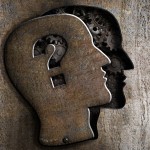Schizophrenia is a long-term mental health condition that causes a range of different psychological symptoms. These include: hallucinations (hearing or seeing things that do not exist), delusions (unusual beliefs that are not based on reality and often contradict the evidence), muddled thoughts based on the hallucinations or delusions, and changes in behaviour. Doctors describe schizophrenia as a psychotic illness. This means that sometimes a person may not be able to distinguish their own thoughts and ideas from reality.
Preventing serious adverse outcomes in schizophrenia

People diagnosed with schizophrenia are 7.4 times more likely to be convicted of violent offences, 8.1 times more likely to die prematurely, and 20.7 times more likely to kill themselves.
[read the full story...]















